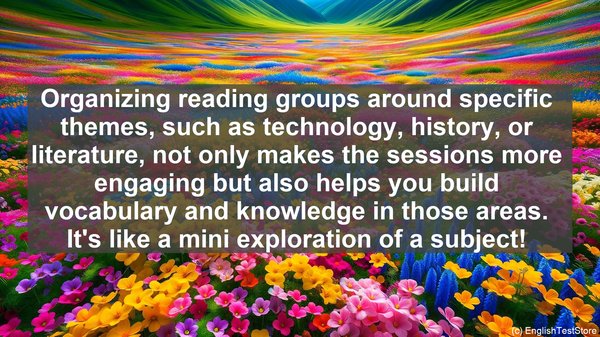Introduction: The Power of Reading Groups
Today, I want to talk about a powerful tool for improving your English skills: reading groups. By participating in reading groups, you not only enhance your reading abilities but also develop your listening, speaking, and critical thinking skills. Let’s dive into the top 10 methods for making the most of reading groups!
1. Theme-Based Groups
Organizing reading groups around specific themes, such as technology, history, or literature, not only makes the sessions more engaging but also helps you build vocabulary and knowledge in those areas. It’s like a mini exploration of a subject!
2. Rotating Roles
To ensure everyone actively participates, consider assigning different roles for each session. For instance, one person can be the discussion leader, another the vocabulary expert, and so on. This way, everyone gets a chance to shine and contribute.
3. Pre-Reading Activities
Before diving into the text, it’s helpful to do some pre-reading activities. This can include brainstorming related vocabulary, predicting the content based on the title or images, or even discussing personal experiences related to the topic. These activities set the stage for a richer reading experience.

4. Chunking the Text
Long texts can be overwhelming. By breaking them into smaller, manageable chunks, you not only make the reading process less daunting but also create natural pauses for discussions and comprehension checks.
5. Active Reading Strategies
Reading actively means not just skimming through the words but engaging with the text. This can involve underlining key points, jotting down questions or comments, or even summarizing each paragraph. Active reading ensures better comprehension and retention.
6. Post-Reading Discussions
The real magic happens after the reading. By discussing the text, sharing insights, and debating different perspectives, you not only deepen your understanding but also improve your speaking and critical thinking abilities. It’s like a mini book club!
7. Peer Feedback
In reading groups, your peers are your best resources. By providing and receiving feedback on each other’s language use, pronunciation, or even content understanding, you create a supportive learning environment where everyone grows together.
8. Supplementary Materials
To enrich the reading experience, consider using supplementary materials like videos, podcasts, or even related articles. These additional resources provide different perspectives and enhance your overall understanding of the topic.

9. Regular Reflection
Taking a few minutes after each reading group session to reflect on what you’ve learned, what challenges you faced, and what strategies worked best, helps you become a more effective learner. It’s like fine-tuning your language learning process.
10. Celebrate Progress
Lastly, don’t forget to celebrate your progress. Whether it’s completing a challenging text, confidently expressing your opinion, or even mastering a new vocabulary word, every small achievement is a step forward in your language journey.
